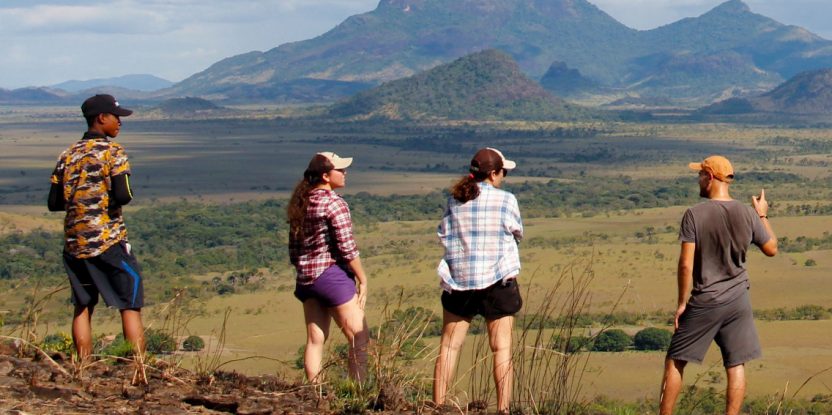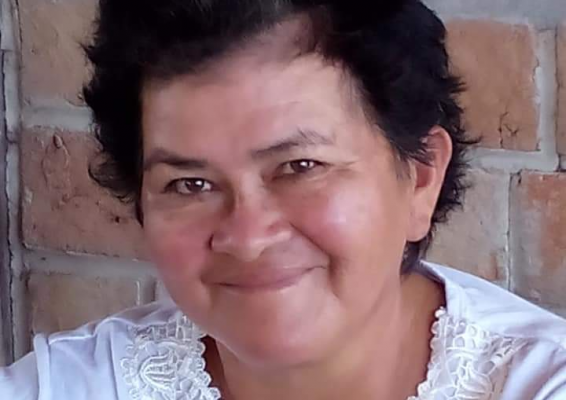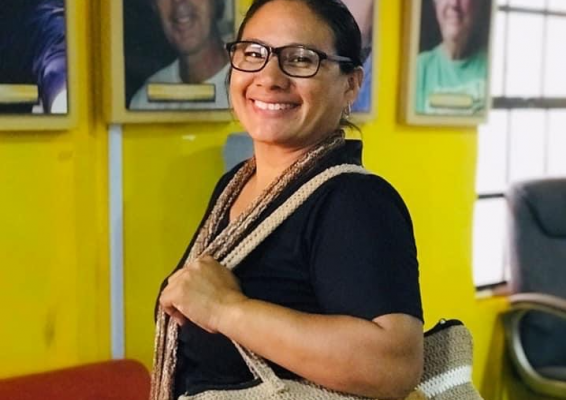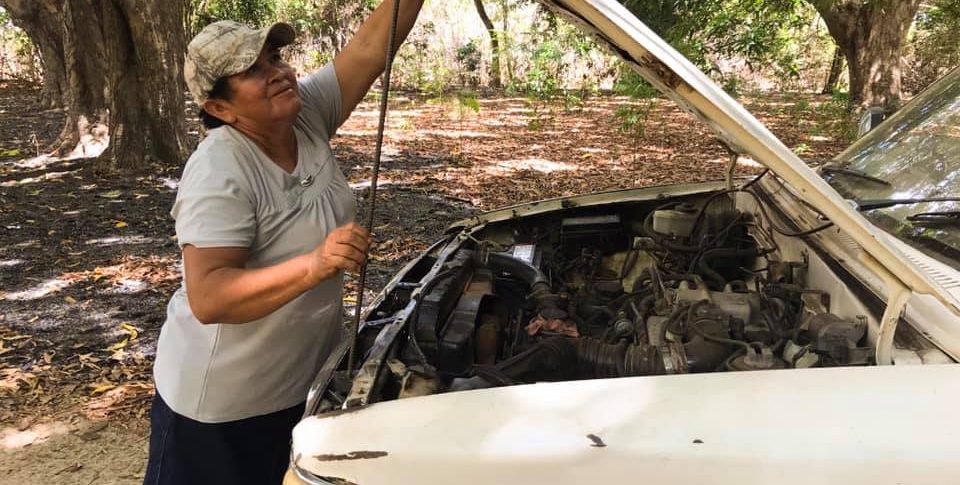
With its rolling savannahs, breathtaking mountains, therapeutic waterfalls, and rich biodiversity, Guyana’s Rupununi is one of the country’s most sought-after tourism destinations. Despite this status, tourism in the Rupununi has remained small-scale, mainly community-based, and family-oriented, with most women involved in more traditional roles.
Yet a new, more gender-inclusive wave of tourism is rising, focused on placing women in roles that enable them to advance their education and economic status. Through its support for Visit Rupununi (VR), Guyana’s first regional destination management organization, the Sustainable Wildlife Management (SWM) Programme in Guyana has over the past three years contributed to improving gender balance in the local tourism industry by tailoring its activities to be especially beneficial for women.
With the SWM Programme’s support, VR has been able to upscale its activities of providing marketing, networking, capacity building, and advocacy to encourage the development of sustainable, responsible, and wildlife-friendly tourism services throughout the Rupununi and the tourism value chain. VR’s operations are oriented toward the continuous development of sustainable and community-based tourism. It has also raised the profile of tourism in the Rupununi through product development, capacity building, innovative marketing, and the sustainable use of wildlife resources, which are part of tourism products and services that provide livelihoods for local communities and women.
To date, 109 individuals have benefited from capacity building in first aid, value and pricing strategies, record keeping, hospitality, health, and safety in COVID in the tourism sector, of which 51percent were women.
One of the women who has benefited is Joan Bell, a member of VR who described how motivated she was to increase the productivity of her modest eco-lodge as a result of participating in these trainings.
While the beginnings were challenging, with no formal tourism training whatsoever, and the remoteness of her location, Bell was determined to have an alternative income as she could not completely rely on farming, given the unpredictable weather and unsteady markets for her produce.
In late 2019, VR, in collaboration with the SWM Programme, conducted its first tourism needs assessment involving ten established and emerging sites across the Rupununi. From this needs assessment, it became apparent that strong interpersonal relationships and a desire to share and learn existed within the communities, but despite this, little practical interaction was occurring between individual operations within the region.
Considering the number of new and emerging locations and the desire of VR to drive knowledge sharing among members, it was decided that a tourism learning trail would be an effective mechanism to facilitate the rapid assimilation of ideas and support new sites with limited exposure. As such, Bell was identified to participate. “I really enjoyed myself and learned a lot, especially with hospitality and preparations,” she said. “Each lodge we visited had something unique to offer. This was the first opportunity I had to travel around my region.”
As a result of these travels, Bell was inspired to improve the services she offers, develop better housekeeping services, expand her recipes. Along with four other women, she enrolled in the tour guide training provided by Visit Rupununi, despite doubts from her fellow participants. She passed.
“This business is hard, especially when your staff doesn’t show up for work and you have to be everything, from the tour guide to the cook to operating the water pump,” said Bell. “My challenge, like many other women, is that we don’t have any kind of formal training in tourism or business management and few opportunities to obtain it. But with support from groups like VR and the SWM Programme, I am encouraged to keep pushing and growing.”
Today she offers adventure-seekers a taste of what it means to live remotely, totally immersed in the natural environment, in a place that time seems to have left behind. The training provided helped her improve her customer service skills and better understand the needs of her guests, leading to an increase in positive reviews and repeat customers.
The partnership between the SWM Programme Guyana and VR has helped boost tourism in the region and create economic opportunities for local businesses. In April 2022, because of this support and partnership, VR opened Guyana’s first regional tourism information centre in the township of Lethem, which serves as the central hub for tourism opportunities in the region, providing business development support for all the regional tourism players, and valuable resources for visitors to learn about the unique culture and natural beauty of the Rupununi.


One of the additional services offered by VR is marketing opportunities for local businesses, such as providing a space to display local crafts and local products for sale. Currently, 17 local businesses use this space to display their products, of which 6are women-owned and 2 are managed by community women’s groups. One of the women whose crafts are on display is Sharla Hernandez.
Hernandez is a skilled artisan who is well-known for her exquisite hand-woven Macushi hammocks and beautiful Indigenous jewellery made from natural materials found in the Rupununi region. Her crafts are not only beautiful but also represent the rich cultural heritage of the Indigenous communities in the area.

Hernandez has always used her craft to supplement her income; however, due to a lack of stable employment and her growing business, her skills and craftsmanship have become her main source of income, providing for herself and her family.
Since joining the VR family in 2017 when she was elected Assistant Treasurer-Secretary, Hernandez has broadened her understanding of tourism in the Rupununi and its intricate linkages to the local Indigenous culture and wildlife conservation. “Tourism has an important role in wildlife conservation in the Rupununi,” she said. “Only after joining Visit Rupununi did I begin to realize the value of wildlife conservation – not only in terms of money but also for the environment and the changing way of life in the Rupununi.”
Visit Rupununi has considerably extended Hernandez’s consumer reach, providing her with an additional venue to sell her crafts and assisting her in better connecting with other crafters and eco-lodge operators, where she provides a demonstration of local crafts for guests, showcasing her cultural heritage.
VR, through the SWM Programme Guyana, has guided the growth of tourism in the Rupununi, creating opportunities for women like Bell and Hernandez, setting the standard for a more inclusive type of eco-tourism that directly benefits women while actively contributing to the conservation and protection of the Rupununi’s unique ecosystems, wildlife and culture.
_____
This is the last story in a series on women leaders in conservation in Guyana. Read the others below:
Leading women in sustainable wildlife management: Meet Lorrie Thomas
Empowering women through sustainable wildlife management: Meet Kim Spencer
Empowering women through sustainable wildlife management: Meet Susan George
Empowering women through sustainable wildlife management: Flora Gomes’ story
_____
For more information about the SWM Programme in Guayana, contact Nathalie van Vliet at nathalievanvliet@yahoo.com.
_____
The SWM Programme in Guyana is part of an initiative from the Organisation of African, Caribbean and Pacific States (OACPS), funded by the European Union with co-funding from the French Facility for Global Environment (FFEM) and the French Development Agency (AFD). It is being implemented by a dynamic consortium of partners that includes the CIFOR, the Food and Agriculture Organization of the United Nations (FAO), the Wildlife Conservation Society, and the French Agricultural Research Centre for International Development (CIRAD). Its aim is to improve food security and the conservation and sustainable use of wildlife in forest, savannah, and wetland environments in 15 countries.
We want you to share Forests News content, which is licensed under Creative Commons Attribution-NonCommercial-ShareAlike 4.0 International (CC BY-NC-SA 4.0). This means you are free to redistribute our material for non-commercial purposes. All we ask is that you give Forests News appropriate credit and link to the original Forests News content, indicate if changes were made, and distribute your contributions under the same Creative Commons license. You must notify Forests News if you repost, reprint or reuse our materials by contacting forestsnews@cifor-icraf.org.